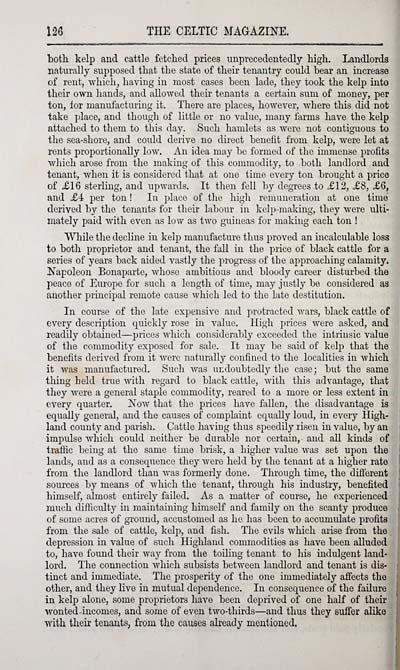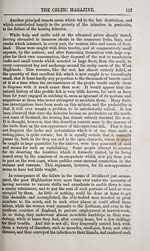Blair Collection > Celtic magazine > Volume 2
(136)
Download files
Complete book:
Individual page:
Thumbnail gallery: Grid view | List view

126 THE CELTIC MAGAZINE.
both kelp and cattle fetched prices unprecedentedly high. Landlorda
naturally supposed that the state of their tenantry could bear an increase
of rent, which, having in most cases been lade, they took the kelp into
their own hands, and allowed their tenants a certain sum of money, per
ton, for manufacturing it. There are places, however, where this did not
take place, and though of little or no value, many farms have the kelp
attached to them to this day. Such hamlets as were not contiguous to
the sea-shore, and could derive no direct benefit from kelp, were let at
rents proportionally low. An idea may be formed of the immense profits
which arose from the making of this commodity, to both landlord and
tenant, when it is considered that at one time every ton brought a price
of £16 sterling, and upwards. It then fell by degrees to £12, £8, £G,
and j£4 per ton ! In place of the high remuneration at one time
derived by the tenants for their labour in kelp-making, they were vdti-
mately paid with even as low as two guineas for making each ton !
While the decline in kelp manufacture thus proved an incalculable loss
to both proprietor and tenant, the fall in the price of black cattle for a
series of years back aided vastly the progress of the approaching calamity.
Kapoleon Bonaparte, whose ambitious and bloody career disturbed the
peace of Europe for such a length of time, may justly be considered as
another principal remote cause which led to the late destitution.
In course of the late expensive and protracted wars, black cattle of
every description quickly rose in value. High prices were asked, and
readdy obtained — prices which considerably exceeded the intrinsic value
of the commodity exposed for sale. It may be said of kelp that the
benefits derived from it were naturally confined to the localities in which
it was manufactured. Such was ur.doubtedly the case; but the same
thing held true with regard to black cattle, with this advantage, that
they were a general stajjle commodity, reared to a more or less extent in
every quarter. Now that the prices have fallen, the disadvantage is
equally general, and the causes of complaint equally loud, in every High-
land county and parisli. Cattle havmg thus speedily risen in value, by an
impulse Avhich could neither be durable nor certain,- and all kinds of
traffic being at the same time brisk, a higher value was set upon the
lands, and as a consequence they were held by the tenant at a higher rate
from the landlord than was formerly done. Through time, the different
.sources by means of which the tenant, through his industry, benefited
himself, almost enthely failed. As a matter of course, he experienced
much difficulty in maintaining himself and family on the scanty produce
of some acres of ground, accustomed as he has been to accumulate jn-ofita
from the sale of cattle, kelp, and fish. The evils which arise from the .
depression in value of such Highland commodities as have been alluded
to, have found their way from the toiling tenant to his indidgent land-
lord. The connection Avhich subsists between landlord and tenant is dis-
tinct and immediate. The prosperity of the one immediately affects the
other, and they live in mutual dependence. In consequence of the failure
in kelp alone, some proprietors have been deprived of one half of their
wonted incomes, and some of even two-thirds — and thus they suffer alike
with their tenants, from the causes already mentioned.
both kelp and cattle fetched prices unprecedentedly high. Landlorda
naturally supposed that the state of their tenantry could bear an increase
of rent, which, having in most cases been lade, they took the kelp into
their own hands, and allowed their tenants a certain sum of money, per
ton, for manufacturing it. There are places, however, where this did not
take place, and though of little or no value, many farms have the kelp
attached to them to this day. Such hamlets as were not contiguous to
the sea-shore, and could derive no direct benefit from kelp, were let at
rents proportionally low. An idea may be formed of the immense profits
which arose from the making of this commodity, to both landlord and
tenant, when it is considered that at one time every ton brought a price
of £16 sterling, and upwards. It then fell by degrees to £12, £8, £G,
and j£4 per ton ! In place of the high remuneration at one time
derived by the tenants for their labour in kelp-making, they were vdti-
mately paid with even as low as two guineas for making each ton !
While the decline in kelp manufacture thus proved an incalculable loss
to both proprietor and tenant, the fall in the price of black cattle for a
series of years back aided vastly the progress of the approaching calamity.
Kapoleon Bonaparte, whose ambitious and bloody career disturbed the
peace of Europe for such a length of time, may justly be considered as
another principal remote cause which led to the late destitution.
In course of the late expensive and protracted wars, black cattle of
every description quickly rose in value. High prices were asked, and
readdy obtained — prices which considerably exceeded the intrinsic value
of the commodity exposed for sale. It may be said of kelp that the
benefits derived from it were naturally confined to the localities in which
it was manufactured. Such was ur.doubtedly the case; but the same
thing held true with regard to black cattle, with this advantage, that
they were a general stajjle commodity, reared to a more or less extent in
every quarter. Now that the prices have fallen, the disadvantage is
equally general, and the causes of complaint equally loud, in every High-
land county and parisli. Cattle havmg thus speedily risen in value, by an
impulse Avhich could neither be durable nor certain,- and all kinds of
traffic being at the same time brisk, a higher value was set upon the
lands, and as a consequence they were held by the tenant at a higher rate
from the landlord than was formerly done. Through time, the different
.sources by means of which the tenant, through his industry, benefited
himself, almost enthely failed. As a matter of course, he experienced
much difficulty in maintaining himself and family on the scanty produce
of some acres of ground, accustomed as he has been to accumulate jn-ofita
from the sale of cattle, kelp, and fish. The evils which arise from the .
depression in value of such Highland commodities as have been alluded
to, have found their way from the toiling tenant to his indidgent land-
lord. The connection Avhich subsists between landlord and tenant is dis-
tinct and immediate. The prosperity of the one immediately affects the
other, and they live in mutual dependence. In consequence of the failure
in kelp alone, some proprietors have been deprived of one half of their
wonted incomes, and some of even two-thirds — and thus they suffer alike
with their tenants, from the causes already mentioned.
Set display mode to: Large image | Transcription
Images and transcriptions on this page, including medium image downloads, may be used under the Creative Commons Attribution 4.0 International Licence unless otherwise stated. ![]()
| Early Gaelic Book Collections > Blair Collection > Celtic magazine > Volume 2 > (136) |
|---|
| Permanent URL | https://digital.nls.uk/78481786 |
|---|
| Description | Volume II, 1877. |
|---|---|
| Shelfmark | Blair.3 |
| Attribution and copyright: |
|
| Description | A selection of books from a collection of more than 500 titles, mostly on religious and literary topics. Also includes some material dealing with other Celtic languages and societies. Collection created towards the end of the 19th century by Lady Evelyn Stewart Murray. |
|---|
| Description | Selected items from five 'Special and Named Printed Collections'. Includes books in Gaelic and other Celtic languages, works about the Gaels, their languages, literature, culture and history. |
|---|

